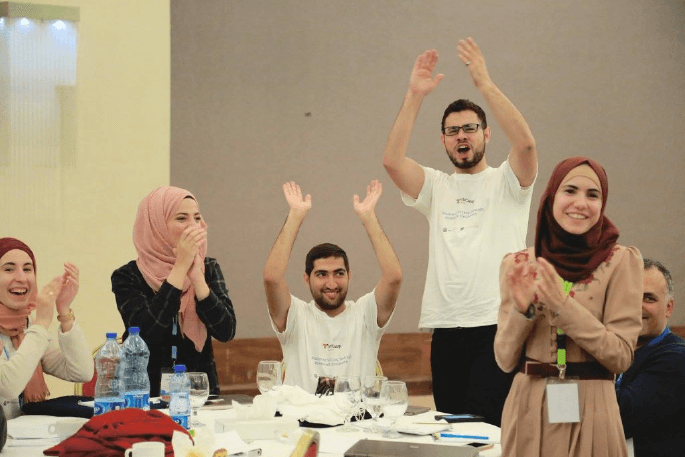Programs
PSD’s main programmatic interventions are focused on three main pillars: educational content development, IR4 skills development, and youth empowerment.
Educational Content Development
PSD’s main educational content development activities occur under the NETKETABi program. The program works towards providing a multidimensional approach to addressing the gap between the educational system and the ever evolving demands of the 21st Century. NETKETABi refers to both the physical learning device and the educational content within. Within the device, students have access to the digitized Palestinian curriculum through interactive books for grades 5-9, access to thousands of educational material through 1700 instructional videos in partnership with Khan Academy, 1009 study collections in partnership with Gooru, and educational and assessment games. While teachers have access to a classroom management application that enables them to manage the class, share educational tools with students, as well as give synchronized exams.
PSD trains both students and teachers on the integration of information communication technology in the classroom and learning process, as well as the use of NETKETABi, its content, and its integration in their lives. PSD also works with parents to familiarize them with the solution and enhance their understanding, and support of interactive learning tools.
Municipalities and local councils have been instrumental partners in PSD’s digitalization initiative. PSD engaged them in training, deployment, and student led initiatives. Local communities were mobilized to cover the cost of NETKETABi devices for schools and teacher training. Municipalities opened their facilities for teacher, student, and parents training.
IR4 Skills Development
In 2015, PSD expanded its programming towards the integration of technology, particularly coding, to reinforce ICT, problem solving, critical thinking, creativity, and teamwork as core skill among Palestinian students. Innovative projects such as iCode introduced coding skills to middle and high school students throughout the West Bank and Gaza who had limited or no previous exposure. ICT themed projects utilize a two tiered training approach where PSD trains university students who in turn train younger students. By the end of the training youth not only learn coding skills but also gain problem solving skills, digital confidence, and a better understanding of their communities due to the integration of civic engagement and design thinking concepts in the project design.
PSD implemented several successful cycles of iCode and will continue training new cohorts of students, ensuring the sustainability of the project and its wide reach among Palestinian students. Other projects that focused on IR4 skills included TechCamp, Internet of Things training, and Polyup.

PSD’s empowerment projects seek to enhance youth’s and women’s skills to expand their opportunities and cement their role as active change agents. Thus projects often utilize service learning,human centered design, and design thinking as approaches and provides tools for youth to not only develop themselves, but also become the driving force behind sustainable community development. In addition, PSD provides students with opportunities to enable them to bridge the gap between their formal education and the needs of the market, enabling them to gain the
professional experience that would expand their skill set and increase their employability. PSD has implemented many projects under this programmatic component such as Youth Earn, Youth Engagement in Economic Development (YEED), Virtual Institute for Employment and Work (VIEW), and most recently the Makkeni project.
